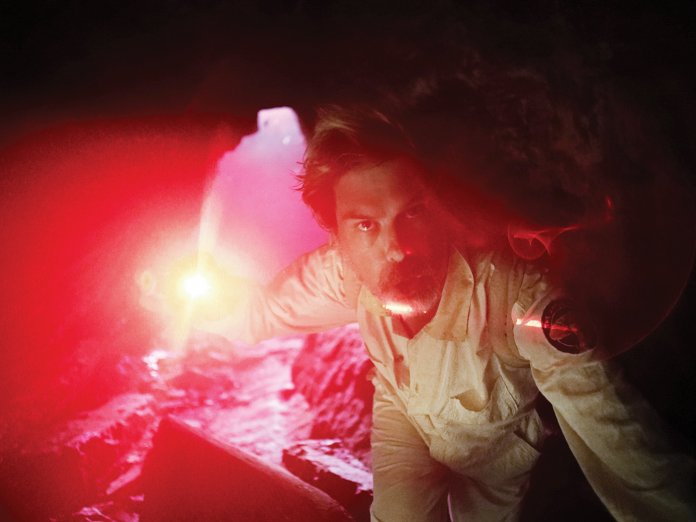Listener expectation is something that most bands who have stayed the course must contend with, choosing either to acquiesce to it, meet it halfway or defiantly turn their backs and wear the consequences. Liars, however, seem to have never even acknowledged its existence. A luxury long afforded them by their record label, maybe, but far more an indicator of their protean constitution. Over 20 years, change really has been Liars’ only constant.
Their 2001 debut was as an NYC-based four-piece, whose They Threw Us All In A Trench And Put A Monument On Top was a set of pleasingly rowdy and abrasive tracks that cut Gang Of Four– and The Pop Group-style post-punk with US hardcore, but closed with a 30-minute, psych-doom raga. Singer Angus Andrew later claimed Underworld’s Beaucoup Fish was actually its inspiration, which illustrates the nature of Liars’ entertainingly unknowable mindset. Done with that, they switched to monstrously degraded noise-rock with dread-filled beats for the witchcraft-themed They Were Wrong, So We Drowned. After relocating to Berlin, they followed up with 2006’s bravura Drums Not Dead, which thrust brutalist beats to the fore while mixing fields of electronic static and no-wave guitar scree with warm, ambient drifts. Subsequent albums variously featured more structured songs, introduced strings and piano, delivered mutant dance music and more. In terms of consistency, Liars have never yielded an inch.
Which is not to say that they’ve been unstable. The creative partnership of Andrew and guitarist Aaron Hemphill lasted until 2017, at which point Andrew suddenly found himself adrift. However, that split opened a fresh chapter and he made two albums in self-imposed isolation in the Australian bush, TFCF and Titles With The Word Fountain. Computer-created, they leaned on field recordings, earlier scrapped material made over and acoustic guitar craft; both were documents of their author’s external environment and inner turmoil.
The Apple Drop is also a kind of mind map, representing change on several significant fronts. Firstly, it’s a stepping out of solitude and a return to teamwork for Andrew, with guitarist and bass player Cameron Deyell, drummer and percussionist Laurence Pike, and Mary Pearson Andrew, his wife, who sings and collaborated on the lyrics. On a deeper level, the record represents shifts both conceptual and perceptual resulting from Andrew’s quitting of SSRI medication and self-administration of psilocybin. He told Uncut: “I took the ’shrooms in all forms. Some group-guided ‘hero doses’, also microdosing in regular and not so micro ways.” The record also sees him looking back at Liars’ history (a first) and considering connections between records (he was keen to foreground drums again), revisiting themes (the reappearance of Mt. Heart Attack, the character that represents fear and anxiety on Drums Not Dead, is crucial) and reviving a few ideas abandoned in previous album sessions. A balance has been struck between live instrumentation and digitally treated sounds, both in experimental pieces such as closer New Planets New Undoings, where rumbling electronics and unintelligible vocals wash over treated keys in a gentle ebb and flow, and in songs with more conventional structures, including the TV On The Radio-toned From What The Never Was and Big Appetite, which suggests nothing so much as a swinging Nine Inch Nails.
Liars’ unpredictability has previously manifested not as genre switching but as apparent randomness within individual tracks and wilful disruption of the flow of the albums as set pieces. The Apple Drop is less obstreperous on both counts. It begins gently, with the floppy (off)beat pattern, subtle electronic drone and feel of a corrupted Disney score that is The Start, then builds steadily to the dark, mid-point intensity of the monolithic Star Search, which summons both the ominous dread and sublime beauty of space and sees a resolution of Andrew’s ongoing conflict with Mt. Heart Attack. The measured climb-down before exit is via the terrific “Leisure War”, with its groovy synth, Fripp-ish guitar passage and clattering beats, and the slow-fried thump of Acid Crop, which connects to the well known “acid drop” and so supplies the album’s title. It underlines one aspect of Andrew’s existential thinking too: “What we do now will forever define us/What we do now will absolutely define us/What they do may somehow hurt us but/What they ever gonna do about what happened to my mind?”
He’s clearly referring to something much broader and deeper than artistic definition but Andrew’s mercurial mindset is again the key to Liars’ singularity. If The Apple Drop is more, in light of their history, a considered experiential teaser than a synapse frazzler, it’s his choice. Once more, expectation can go to hell.


